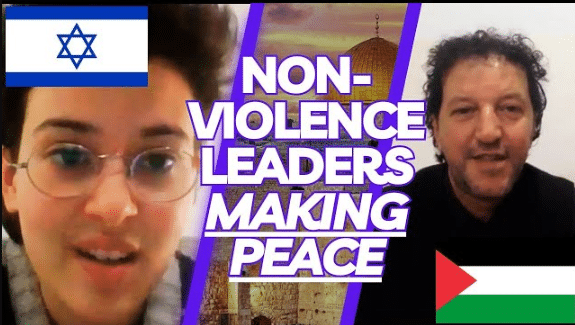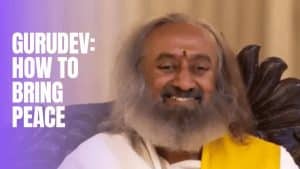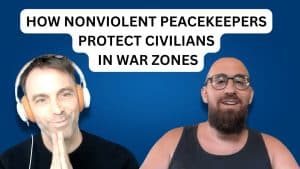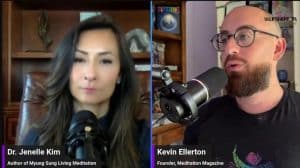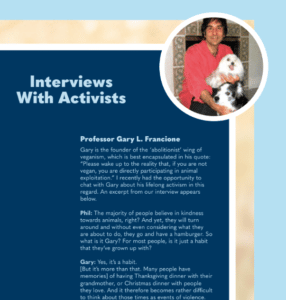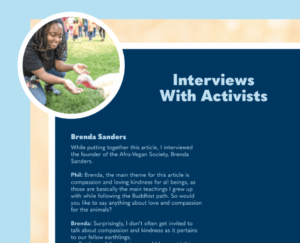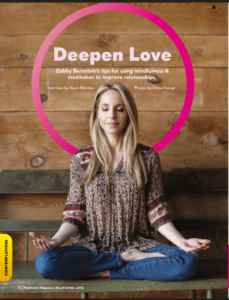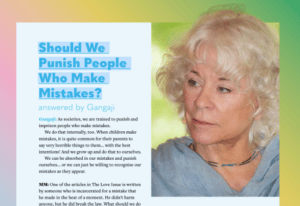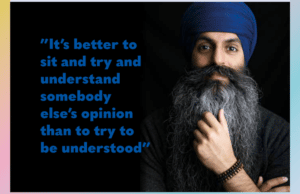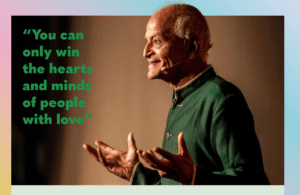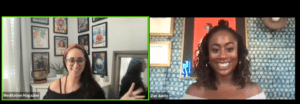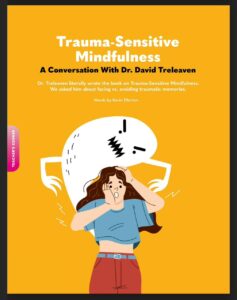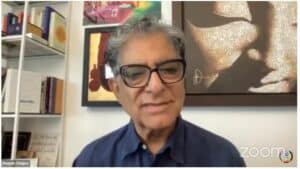Introduction by Kevin Ellerton
We are here today with Ali Abu Awwad. He is one of the most, if not the most, prominent Palestinian non-violence activists currently living in the West Bank. He is the founder of Taghyeer, which means change. It is an organization and a movement for the nonviolent resolution of the Israel-Palestine conflict based on Gandhian principles. Ali, I believe you were relatively influenced by Gandhi, is that right?
Ali Abu Awwad
Yes, absolutely.
Kevin Ellerton
What’s your philosophy on nonviolence and where did it come from?
Ali Abu Awwad
Nonviolence for me is the celebration of my existence and my people’s existence. In general, it’s the art of our humanity as human beings. It gives the taste and the meaning of our humanity because everyone is a human being, but I’m not sure that everyone is acting as human beings. Being a nonviolent person is to identify with our humanity more than anything else, which is the highest value of our existence on this planet and in this short life. What gives me a taste to wake up in the morning every day is that I know I could be the prisoner of my victimizer, or I can be the free soul that will achieve my goal in my life. Even if I don’t achieve this goal of independence, freedom, and security for all the people of this land, it’s the way I choose to spend it.
Kevin Ellerton
Thank you. That’s a beautiful statement of the personal and spiritual aspect of nonviolence. Do you feel there’s also an effectiveness aspect to the philosophy of nonviolence? Do you feel it’s more effective than the tactic of using violence to achieve political goals?
Ali Abu Awwad
Definitely, especially in our conflict, considering the complexity and the background and the narrative of both sides. Then you realize it’s just by nonviolence. You don’t have to be a peacemaker to realize that. We are so intertwined, both people with different identities, in this only land where we both belong and no one is going to go anywhere. Even worse than that, people will fight until the last drop of blood because this is the only place where we can thrive and exist. For me, having said that means that we don’t need to be big political leaders to realize the political fact that this conflict cannot be solved by violence. Many conflicts can be solved by violence and by militant actions, but there will be nothing to live for. The destruction and the damage that can be created will need tens if not hundreds of years to heal. What is winning here? I don’t want freedom to be built on hundreds of Jewish graves, and I don’t want Jewish security to be built on my dignity and freedom. This is a fact that manages all of my life and my thoughts and my philosophy and even my movement.
Kevin Ellerton
I tend to agree. I think that violence just breeds more violence and that the only way out of this kind of conflict is nonviolence. I wonder how you came to this realization and what your story is since you were a kid. I remember hearing that you had originally participated in violent protests as a kid and maybe in the first intifada, and then you were imprisoned. I’d like to hear more about your story and the evolution.
Ali Abu Awwad
I was born as a refugee in the West Bank after my family was thrown out of our town, Kfar, which is in Israel today. I was born to a very political mother. My mother used to be one of the leaders of the PLO, the Palestinian Liberation Organization.
I participated in the first intifada, actually not because of politics. I saw the humiliation of my mother in front of my eyes when I was a child. She was arrested several times by the Israeli army and security forces. It didn’t take me a minute to participate.
In 1987, I started throwing stones at Israeli soldiers. I have never considered this as a violent act, even though throwing a stone at a human being can kill him. But throwing a stone at a 60-tonne tank, that’s insane. It was more my scream to be free, my scream against injustices, and my scream for my legitimate rights as a human being to live where my rights are in harmony with my life. This is my relation to the conflict. I cannot go into details because if I do so, it will take days to explain why Palestinian kids throw themselves on the street, facing their death by throwing rocks at heavily armed and trained soldiers.
On the other hand, there was something inside me seeking a dignified role to practice my political identity as a Palestinian, which I didn’t see any platform for. So, I just threw myself into the conflict.
I was arrested with my mother. I faced very hard torture and humiliation by the security officers, as well as my mother. They put me in prison for four years because I refused to give evidence against my mother.
Actually, going to prison for me was shocking. They gave me ten years as a matter of revenge because I refused to give evidence. I was just 17 years old. I always wanted to travel, to study, to have normal conditions. I never thought to kill a human being or to hurt a human being. Then I was broken, totally broken.
I lost everything: my future, my dignified conditions, and the meaning of my existence. I lost it by being in prison, and I lost my opportunity to study. I had an insane Palestinian dream at that time to become a pilot. But Palestinians couldn’t be pilots. We had no passport, no recognition, and we were even considered terrorists or dangerous by many countries around the world.
Anyway, I went to prison with my broken heart and dreams… and found out that I was going to one of the best universities you can imagine. Because Palestinian political prisoners turned the prison into one of the best universities. You have to study; people will exam you. You have to read books, learn languages. Most of my English came from there, my Hebrew came from there. Month after month, I became so busy with the system that when I told my friends outside I was busy, they couldn’t understand what I was talking about. That was my real world that educated me to become a human being.
Month after month, I wanted to visit my mother in her other prison, which Israel always refused, which was illegal even by Israeli law. We decided to go on a hunger strike to see each other, a hunger strike of 17 days of starvation. By the end of it, we managed to get Israel to agree that we would meet. I met her for 45 minutes, and all of this pain disappeared.
Then I came back to my prison very confused, very conflicted because I thought that what had been taken by force should be achieved back by force. Until that minute, I realized that with all of my right cause and right beliefs of my legal rights, I was blind to the rightest weapon that I had never used, which was my humanity. You know, in a hunger strike, you don’t harm anyone; you just harm yourself. But the goal is not to suicide. The goal and the deepest message in that is that you are telling your jailer, your oppressor, that whatever you are going to do, I’m going to embarrass you among your own humanity because I’m not going to do the same as what you do to me. You become the reflection of him; you become a mirror of his humanity. I always said that in nonviolence, if you think that our humanity is our weapon, you are making a big mistake. It’s our enemy’s humanity in nonviolence. But you have to be able to bring it out where your rights are not arguable anymore by him. So, I started learning nonviolence in prison.
Then I was released by the Oslo peace initiative. This process of having hope really failed for many reasons until 2000 when we could see the occupation going on and on with no hope.
The second intifada started in 2000. I decided not to take a realistic part because it didn’t speak about me. But on the other hand, I couldn’t have normal conditions. So, I was stuck.
Until one day I was badly wounded by an Israeli settler near Hebron. I was evacuated to Saudi Arabia for medical treatment and learned that my brother, Yousef, 31 years old, was trying to come back home, was stopped by a group of Israeli soldiers, and very violently murdered for no reason.
At that minute, I faced the biggest exam of my life. Am I truthful to my beliefs of nonviolence, or can I just give up everything and take revenge? Especially, you know, revenge was the priority because these people came, occupied my land, turned us into their victims. I have all the right on Earth to take revenge for many reasons, not just for my loss. But on the other hand, I am still me. I am still a human being. I am not a murderer. How do I deal with that? How can I wake up in the morning? For what?
So, I was struggling between both of these values: life, humanity, and revenge. Until one day, my mother actually hosted a group of Israeli bereaved families, people who have lost someone in the conflict, in 2002. For me, that was the first time — and believe me when I say that — I sat in my home with Jewish people, and saw a Jewish person cry.
I couldn’t imagine that Jews have tears, fears, or feelings until that moment. Then all of what I had been struggling with, because I wanted to feed this monster inside me by labeling the other as not being human beings, but that minute, this bereavement brought us together to the level that I realized we are sharing the same humanity.
Yes, we are not sharing the same life conditions. Even politically, our relationship is unequal. But we are, by the end of the day, equal by what we are sharing under the ground. I realized actually because of that and because we are not able to share what is on the ground, we are just sharing what we have underground, which is the bodies of our beloved ones. I decided to do everything possible for both sides to be able to share what is on the ground.
Kevin Ellerton
Wow, thank you. Part of what you were mentioning at the beginning of your story as a young Palestinian kid throwing rocks, you mentioned that you can’t really go into the details of why Palestinian kids throw rocks because it’s very deep. But I think it is important for people to understand, and for us to understand as peace activists, what is driving violence on both sides. One thing that I’ve seen, I have relatives in Israel, and I know how they think and what they think. A lot of people on the Israeli side believe that the violence is mainly because of Islamic fundamentalism, where people believe that they should conquer the land for Islam. But I know that, from all the Palestinian people I’ve talked to, that’s not what it’s about. It’s about, “This was our land, and it was taken from us, and we’re now under occupation and oppressive conditions.” Do you feel that both of these are factors in the violence, that the kids that are throwing rocks, as an example, on the Palestinian side, or do you feel it’s one or the other?
Ali Abu Awwad
Yeah, that’s a great question. Thank you. I think when people have lives where all of their conditions are just miserable—and when I say miserable, you live in a house that doesn’t have water while people on the other side have swimming pools. It takes you three or four hours to reach your school just as a child. You see your mother get beaten in front of your eyes, or your brother get killed by the army, by the extreme settlers, and you experience an existence with no future. You cannot even imagine a normal future because your world is about just humiliation, injustices. Then you lose your fear to die. When people lose fear to die because they lost their meaning of existence, life has no meaning anymore, especially for kids who grab a knife and go to stab soldiers. They know in advance that most of them will get killed before even touching the soldier. They know that, but they have lost their fear to die. This fuels violence. They don’t identify with it. They were not born for this. They were born to live normally like any human being. So, that’s number one.
Number two, when you belong to a nation that paid prices of their existence for another nation to exist on the same land, and you compromise—and this is what happened when we in Oslo recognized Israel but we didn’t recognize the occupation. When the occupation goes on and on, and we lose our hope of any peace possible with Israelis, then violence becomes the language and the response.
Number three, the Jewish fear itself. We live with the Jewish fear. We face this fear every day, and we pay the price of Jewish fear. Actually, the Jewish fear has become our biggest enemy. It’s not the Jews themselves; it’s their fear that has been implemented in politics by someone like Netanyahu. He’s a manager of Jewish fear. He’s not a manager of the Jewish future in this land. That’s what I believe.
Number four, when you lose your direction, when you don’t have in your society any platform that will adopt you and raise you in normal conditions to be a better person for your future, and you have a failure of your own political leadership with corruption, with misleading, with all of that, then violence becomes the answer.
Finally, when the international community, big parts or powerful parts of it, keep investing in this conflict, where Jews and Arabs are paying the price of their blood and their future because of international politics investing in hate, because this conflict is a good environment for outsiders to invest in for their own politics, then violence is the answer at the end of the day for that and for many other reasons. Look where we are. If violence was the answer, we would have been able to solve this conflict many years ago. By the way, it’s never about ideology. It’s never about Islam or Judaism. I know that both religions were created by the same God, and I know that there is no religion on Earth that supports the killing of innocent people. But there are politicians who use religion to justify their acts of violence, militancy, and humiliation against others.
On the other hand, to be an extremist, I’m not sure you need a specific ideology. I’m not sure even if you live such conditions like my conditions, I’m not sure you need a specific curriculum to hate. It does the job for you even without religion, without ideology. Finally, I know that this conflict has religious roots, but it’s not a religious conflict. So, we need those leaders and those religious leaders to be part of a political approach that will manage the solution in a political platform.
My proof to all of those who say we use Islam, we are fanatics, we are extreme: the constitution that we voted for after Oslo was a secular one. I have never considered my society as a religious society, but the culture is much deeper than religion itself. So, before people judge and label you, they have to understand. For people to understand, we have to be a just lawyer for a just case. We cannot be a bad lawyer for a just case, especially when there is injustice in the international court.
Kevin Ellerton
Thank you so much for that answer, Ali. I’d like to admit now into the conversation Einat Gerlitz. Einat, I’m going to click the admit button now. She’s joining us from Israel. I just want to introduce Einat for a moment because she’s joining us now from Israel. She is a conscientious objector from the Israeli army, the IDF. In Israel, conscientious objectors are called refuseniks, which means you’re refusing to join the army for moral reasons. I believe that in general, the refuseniks are put in jail by the Israeli government because they don’t recognize conscientious objectors as a legitimate reason not to join the army. Einat, is that about right? Were you put in jail? If so, for how long?
Einat Gerlitz
Yeah, that’s true. I was imprisoned for 87 days in total. I refused on September 4, 2022, but basically, when I refused, I had no idea if I was going to go in for two years or for two weeks. The law doesn’t say for how much time you’re going to sit. I was sentenced four different times in a total of 87 days. But now I have a friend, a refusenik, who’s sitting. He’s going to almost finish 105 days, and there’s still no hope for an exemption. So, it really differs.
Kevin Ellerton
Wow, it sounds like they’re getting more intense since the war started. So, Einat, just to catch you up, we were talking about nonviolence. I know that’s a big part of your own philosophy, so I want to ask you some questions about that as well and start talking between all three of us about maybe ways that we can move toward peace. The conversation I was just having with Ali was about how many Israelis believe that the source of the violence from the Palestinian side is because of radical Islam, jihad, and things like that. But Ali was explaining that actually, in reality, a lot of the violence is coming—or most, if not all, of the violence is coming because of the oppressive occupation and the oppression that the Palestinians have had to go through over the past 80 years or so. Einat, is that recognized in the Israeli side near you? Do people think where you are that the Palestinian violence is mainly because of radical Islam and jihad, or do they recognize that it’s because of the occupation and the oppression?
Einat Gerlitz
It’s seen as because of the radicalization and the fundamental Islam. But I’m in the nonviolent field; that’s where I focus on.
Kevin Ellerton
I think personally that if Israel is—if it’s true, and I think what Ali is saying is true, that the occupation is the source of the violence, I think if the Israelis realized that, then they would start to realize that maybe if we actually stop building walls and occupying and doing all this intense security stuff, that the violence can stop on that side, and then we can move toward peace. I’m happy that Ali has explained that so clearly, that the violence is chiefly coming from the occupation and the oppression. Einat, do you think that that’s something that can be communicated to the Israeli people in a way that they would understand and hopefully be able to move away from the oppressive security measures?
Einat Gerlitz
I don’t think that you can say that all the violence is justified because the Palestinians are under oppression. I think it’s one of the main reasons, not the only one. I believe in nonviolence, and I think that the hope is going to come from there. I think violence is always problematic and never brings a solution, as how I see it. Of course, a nation that’s under occupation for 75 years and under siege is under a lot of pressure, and that’s one of the reasons, but not the only reason for violence. I think there are many reasons. Some of them come from fundamentalism in religion, just as in the Israeli society we have crazy, scary fundamentalists on the right who are using Judaism as a justification for violence. We can see that in many different religions. Everything in life has many reasons.
I really believe that the only way to stop this circle of violence and blood is working together and being in solidarity with each other and continuing the nonviolent resistance, even at the hardest times. I think staying human and looking at the injustices in the eye is the most important thing we can do, and to raise our voices and not let the violent and revenge-motivated mainstream take the whole stage. I’m trying from where I am as part of the refuseniks network and also in activities in the South Hebron Hills with the community there. There’s a strong nonviolent resistance going on for the past two decades at least, and I really believe that’s where the solution is going to come from.
Kevin Ellerton
Thank you. I want to go to Ali for a moment and ask: Einat was mentioning that she thinks that the violence stems from multiple causes on both sides and in every conflict. I think it’s important for us to understand, is this true? Is there some of it that comes from jihadist fundamentalism and some of it that comes from the occupation and the oppression? It’s good for us to understand the truth of the matter so that we can hopefully find solutions that can ensure security for everybody as we move into the peace process and move into hopefully lasting peace. So, the question is, do you think that it’s true that there are multiple factors to the violence besides the occupation and the oppression? Do you think there’s also jihadist fundamentalism driving some of the violence?
Ali Abu Awwad
As I told you, violence has never been an identity for people here, neither for Palestinians nor for Jewish people. I think the mentality and the psyche of both people have more humanity than violence.
Believe me, after 23 years of engagement with so many Israelis and Jewish people around the world, so many Muslims, I realize that this is a political conflict that religion has been invested in a bad way. Religious people, whether religious leaders, become politicians, and this is where God gets upset. Or politicians become speaking in the name of religion, and there is so much investment in the political conflict in religious values. When you mention Jerusalem, the problem of Jerusalem is not a religious problem. It’s a political problem, but it has religious values that have been preventing us from reaching a political management.
On the other hand, in every religion, you can find a hundred reasons to kill and a thousand reasons to reconcile. It’s up to you; it’s up to the people. When you decide to kill someone, you don’t need God to justify that.
There are many other Muslims and Muslim countries that are not fanatics. Look at the Emirates today. They are normalizing the relationship and did normalize with Israel. It’s a fake normalization. It’s just between politicians, but the people are not there. Look at Qatar, Kuwait, Indonesia — all of these Islamic countries are not fanatics. It’s up to the system and the world how to view that.
For me, as a Muslim, I’m telling you, killing innocent people doesn’t represent my case. My case is more moral and just than to be represented in a fanatical way. On the other hand, I believe that Einat and many others exist. I believe in the humanity of my “enemies” before the humanity of my own people.
That’s why the Palestinian nonviolence approach can work and achieve my rights more than any violence. By the end of the day, any management of this conflict, when our politicians—hopefully they will get enough pressure on them to sit at the table and take hard decisions—they don’t need God to be there. They won’t even sign the agreement in the name of God or the name of Judaism or Islam. They will sign a political agreement.
There is no justification for killing. But sometimes we are stuck with the Jewish fear, the Jewish lack of trust, and the Jewish and Israeli justification of the occupation under security.
That’s why in my manifesto, I raised two important questions among Palestinians and questions to the Israeli Jewish people.
I tell Palestinians, do you recognize the legitimate Jewish identity on this land? Because we can start from there to build any future agreement. On the other hand, I ask Israelis, are you occupying people for security or are you occupying land for ideology? Because if it’s for security, then it’s me and your responsibility. If it’s about ideology, this is to argue with God, right? It means that it’s unsolvable. We cannot solve it. So, Israel today has to decide: is this occupation about security? It has never promoted security. Palestinians have to decide: are we able to recognize the Jewish belonging to this land where we can build a lasting peace? Because peace for me is not about borders. The best thing that this horrible act of right wings and right-wing government and violence that they brought on the table—something that we were hiding—they brought identity.
Today, we need to negotiate and discuss identity more than behaviors. Occupation is behavior. We should not be denying each other’s identities, but we should take responsibility for each side’s behavior. I’m ready to take responsibility for my people’s violence, but I need a partner who will take responsibility for the occupation. Not by good intentions, not by flying to Greece for a nice peace conference in a five-star hotel. I’m done with that.
We need strategic thinking with massive action that will bring our identities to the harmony of life. So, peace for me is a place where these two legitimate identities will fit in a political design that no one has to pay the price of their security, dignity, freedom, or nationality. This is peace for me. Any politician who designs that will be my hero. But you know what? There will be no politician to do that as long as we still play the game of blame, the competition of suffering—who suffers more. We are all victims. Let’s agree about that. We are all victims. By the way, me and Einat are not the minority. We are the minority who represent the silent majority because the majority are silent. The violence is many times screaming louder, even though I think in most people’s hearts they do believe in what we’re speaking about.
Einat Gerlitz
I completely agree with you, Ali. I think that the only way to move toward a solution is for all of us to start seeing our blames and where we’re at fault and to take responsibility and to see the other side’s pain. That’s one of the biggest problems here, that we grow up very separated. We don’t know enough about each other’s history, and what we do know many times is very manipulated. We’re just not able, when we grow up, to know each other’s true culture and history and our pains. Israelis and Palestinians, many people feel as if they’re the only victims and the other side is completely to blame. A lot of times, it makes people very close-minded because that’s what they grew up on. I think the biggest courage is to be open to hear different stories and to hear about the complicated reality that maybe we were not told about when we were younger. The real courage, I think, is to look those stories in the eye and to be open to hear them, and then to look for all the colors of what happened and what is happening to all the people in this land. That’s the first step to move on to something better.
Kevin Ellerton
Thank you. People in general say there is no peace without justice.
Ali Abu Awwad
For sure. Actually, I don’t believe in just solutions. I’m sorry. I believe in justice as a value, but I don’t think there is a just solution for this conflict. There is a fair solution. What I will add to what Einat said is that there is no peace without truth. We have to be truthful to ourselves and to the other.
Kevin Ellerton
That’s actually something I wanted to ask you both about. Ali, you were saying that we have to recognize and take responsibility for the problems that we bring to the table. You were saying, “I take responsibility for the violence on my side.” Einat, I’ve heard you speak before about the responsibility of Israelis for the occupation and the oppression of Palestinians in previous podcasts. How do we— Is that enough for just people like you and Einat and me and peace activists that are really, like you said, the small minority of people that actually speak up for the large majority? Is that enough, or how large
does the recognition and taking responsibility have to be to actually move toward real peace on the ground?
Ali Abu Awwad
Let’s talk tasks. One, as a response to this recent reality, we need a ceasefire. More than that, we need a cease-conflict. A ceasefire that will be under an international political umbrella that will allow a cease-conflict as well. That’s number one. Immediately, we need aid for sure, for everyone. We need a process to start releasing innocent people, prisoners, hostages—whatever you call them on both sides. This approach will guarantee and fuel hope. We need fuel for hope. We have hope, but hope is destroyed. We need to fuel it by practical actions on the ground. Number four, we need a guarantor — an international guarantor and an Arab guarantor — to get engaged directly in this approach and give three to five years that will end by a recognition of two states by every party around the world and every country. Because we need both sides to take responsibility and to stop this competition. When you do it in a guarantor way that it will end not with more settlements like Oslo and not with more suicide bombers, people will get back their hope. This is the only approach that I see.
We need to get rid of the recent political leadership. Both of them are horrible. Both of them are corrupted. We don’t have leaders; we have politicians. Politicians are just managers of reality fueled by fear, anger, and hate. Leaders are managers of the future, fueled by hope, responsibility, and humanity at the same time. This is the difference between both sides.
We need all of that to be on the table with the most important thing: massive pressure on political leadership on both sides to sit at the table and take hard decisions. Peace now is something really hard. It’s not like any time before, but we have to realize that it’s important right now. If we are not able to take the painful injection and go to the surgery, this wound will be bleeding every year, every month, and every moment.
Einat Gerlitz
I completely agree with everything. I think you said it wonderfully. I really want to take this opportunity to speak out and call to action everyone who’s watching us and listening to us. We need you guys. We’re doing as much as we can from here, but a lot of the pressure to either continue the war or to stop the war will come from abroad.
We need the activists abroad to pressure their governments to put the people first. Put the Palestinian people and the Israeli people in front of their eyes, not the violence and not the Zionism. We need them to look for the people, to take care of aid, to take care of the hostages, to really pressure and move forward toward what Ali was talking about: a real, true political agreement, a sustainable one that’s in the interest of the people and not the politicians. We need the people that are going out on the streets and the ones who are still sitting at home with themselves.
We need you guys to go out and demand your decision-makers, wherever you are, to stop this war, to let in aid, to bring back the hostages, and most importantly, pressure them for leading a political agreement. Otherwise, we’re going to see another war like this in the close future if we don’t have a real agreement. Just a dry ceasefire is not going to be enough.
Kevin Ellerton
Thank you both for those deep and powerful answers. Einat, you were just touching on international activists globally, like me here in the United States. Everybody is horrified by what we see in Gaza and October 7th. We’re all horrified by the terrible violence, and we try to grasp onto things that can try to make it stop. This has been not just this past few months, it’s been for decades that this has been going on.
What a lot of people here in the United States and abroad do is they choose one side or the other, and then they vociferously, aggressively protest specifically for that side and against the other side. I’ve seen this as the biggest way that people around the world relate to the conflict.
People like me and spiritual people, meditation people, we try to see that everybody is human. We try to see what’s going on on both sides, keep our minds open, and talk about how we can get to peace.
Brené Brown also recently made a post about peace, talking about both sides, and got very attacked for it by people on the left saying she wasn’t pro-Palestinian enough. This type of thing happens on both sides. People in the middle, people who are really just pro-peace and pro-humanity, are continuously attacked on social media, whereas people that are one side or the other are just feeling their own social media bubbles. What do you both have to say about this? Should people take one side or the other and fight for that side, or should people take the side of peace and humanity? Which of those is more likely to lead toward peace?
Einat Gerlitz
I think you’re bringing up a really important point. One of the biggest problems right now is that people abroad are very invested, and that’s amazing—we need you guys—but people are choosing to see the reality very black and white, and that’s very dangerous. We need people on the pro-human rights side.
It’s important to say that looking at both sides is not necessarily seeing them as equal, and it doesn’t erase all the blame and the responsibility. Looking at both sides means seeing where each side is at fault, what are the problems, seeing the bigger picture of what led to this point. I think that’s where people should be—on the pro-human rights side and amplifying the nonviolent voices. That’s what we need right now.
Ali Abu Awwad
I just came back from the Geneva Human Rights Film Festival. My message was so clear and direct: be pro-solution. It’s easy to be pro-Israel or pro-Palestine, but be pro-solution. For people to be pro-solution, we activists on the ground need to make it very clear because it’s so confusing, as Einat said. We are not ready—our message to the international community: we are not ready to pay more prices of our identity, existence, or security because of the gap that people in the diaspora are creating by taking sides.
Yes, we’re not equal, but the solution will bring us all equal. If we are not equal through the solution, it’s going to be our responsibility, not the other side’s responsibility. It’s up to us. Finally, we’re not calling you to be part of hope.
I’m not so much optimistic, but I’m a believer in what I’m doing. We’re calling you to adopt it as an ideology, not as a tactic. Nonviolence cannot be—nonviolence is like love. You cannot love someone tactically; it doesn’t work like this. It has to be more than even a strategy. It’s a mentality.
We need the international community’s commitment to a solution, especially, Jews and Muslims around the world: Not in our name. Hate is not in our name. Divide is not in our name.
Just imagine in Washington DC a million Jews and Muslims marching the streets to put pressure on Biden to be pro-solution more than being pro-this or pro-that. This can work. Because when Jews stand up for Palestinians, the State Department will listen. When Muslims stand up for Jews, they will listen much better than when we speak for ourselves.
Kevin Ellerton
Wow, thank you both for those powerful answers. Ali, I do see hope in that, imagining so many Jews and Palestinians, or Jews and Muslims in general, marching on Washington to be pro-solution. I hope that that can happen soon. I want to see what we can do to get there. Before going to that, I want to finish my question on choosing sides because this is something that when I respond in the way that you both have, people often—there is this concept that people have that neutrality supports the oppressor. Have you ever heard this or thought about this? What would you respond to that?
Einat Gerlitz
I’ve heard of this. I think that neutrality can be on the side of the oppressor. I think that we’re not calling for neutrality; we’re calling for people to be active. Neutrality can be dangerous. What we’re talking about, again, is the pro-human rights stance, the nonviolent stance that’s not extremist but also does see the problems, the faults, and the pain. It recognizes the pain, it recognizes the inequality, but it strives for a solution for everyone, not just for one of the sides. It’s important to put the focus on that difference: being just randomly neutral or being actively pro-human rights and actively recognizing the pain and what needs to be done considering the power dynamics.
Ali Abu Awwad
A big part of it is our fault as activists because we have never strategized our movement. There is so much division within the peace movement itself. We’re so divided over opinion and vision for the solution. We are so divided over competition for resources. Who’s better? I’m the good one, and these are the bad ones. There are tens of thousands of non-profits and NGOs, part of them run by the best politicians for peace who are just the retired ones, just generals and politicians who become Mandelas just after they retire. They open these NGOs, they run for the USAID money, and they hire the best staff. They fly five-star and first-class. Number four, we are also able to argue just behaviors. We don’t even want to recognize identities. I’m talking about those who are pro-solution. I think the answer is to strategize, to have a strategic action, a massive national plan on both sides. I just came back from a conference in Switzerland, where 74 top leaders, politicians, and security figures met to try to figure out a strategy for both
sides. We will invite the international community to invest in a practical strategic plan for a solution, not just sit with each other and have hummus and hugs. This is not the nonviolence that I advocate for. It’s now serious. We have to create an alternative as a parallel to the alternative of violence, hate, and militant extremism. We have to be at that level; otherwise, it’s going to be a waste of time.
Kevin Ellerton
Wow, that’s very powerful. We only have a couple of minutes, so I just want to ask: did they come up with anything that you feel is feasible and hopeful to actually work, that you think will actually work or is likely to be implemented? Are you hopeful that this is going to work to bring peace?
Ali Abu Awwad
This is going to be the nightmare that will create the dream.
Kevin Ellerton
But do you think that the strategies that the 74 leaders came up with at that conference in Switzerland, do you think they came up with anything practical that can actually be done?
Ali Abu Awwad
Yes, we agreed on a charter. Hopefully, it will be published soon. I cannot allow myself to speak in detail, but we agreed on principles for the future that any peace agreement has to include. These are very important principles to be decided on. The top of them is mutual recognition of identity and belonging to the same land.
Kevin Ellerton
That’s very powerful. Einat, are you hopeful that peace can come in our lifetimes? Are you hopeful for that? Do you believe that’s likely?
Einat Gerlitz
I wish. I wish. I really wish. I wish for it. We work for it. We have no other choice. We’re working for it, and hopefully, it’ll come in the near future.
Kevin Ellerton
I wish we had more time to talk, but I really appreciate both of your time. I know that you’re doing great work and very important work in a really difficult area and sometimes feeling like hopeless conditions, forging ahead and doing things that are putting you sometimes in danger and being very courageous about it. I really just want to thank you from the bottom of my heart, both of you. Thank you for the work that you’re doing. We need more people like you, and hopefully, through this video and through the Meditation Magazine peace issue that’s coming out in the summer, we will help create more people like you, more peace activists, human rights activists that are on the side of peace and humanity rather than just taking one side or the other and fighting it out. Thank you so much for being here. I really appreciate both of you.

